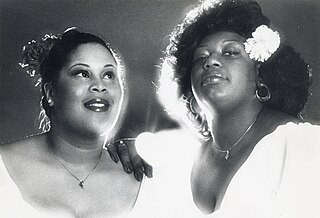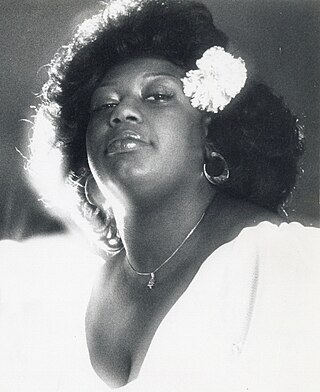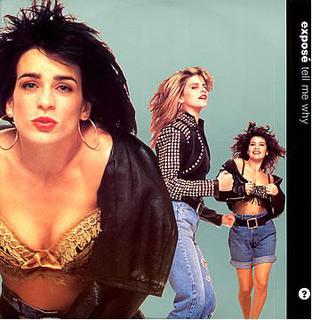
The Weather Girls are an American female duo whose best-known line-up comprised Martha Wash and Izora Armstead. Formed in 1976 in San Francisco, California, Wash and Armstead began their musical careers as Two Tons O' Fun, the female backup duo for disco singer Sylvester. After several years of singing background for Sylvester, the duo was signed in 1979 to Fantasy Records as Two Tons O' Fun. The duo changed their name to The Weather Girls and were launched into somewhat more mainstream recognition following the release of the single, "It's Raining Men" (1982), which became their first number-one song on the US Dance Chart and their biggest hit. Despite having several hit songs on the Dance Chart as Two Tons O' Fun and The Weather Girls, the duo never achieved a top 40 hit on the main US Hot 100 and ultimately disbanded in 1988 after the release of their self-titled fifth album The Weather Girls.

Izora Margaret Rhodes-Armstead was an American singer. Known for her distinctive alto voice, Armstead first achieved success as one half of the duo Two Tons O' Fun, along with Martha Wash, as they sang backup for American disco singer Sylvester. The duo obtained their own record deal as Two Tons O'Fun in 1979. They released three consecutive songs that were hits on the Dance Chart. The duo was renamed The Weather Girls in 1982 after the release of their single "It's Raining Men", their most successful single. As a duo, The Weather Girls released five albums and were also featured on Sylvester's albums.

"Le Freak" is a 1978 funk-disco song by American R&B band Chic. It was the band's third single and first Billboard Hot 100 and R&B number-one hit song. Along with the tracks "I Want Your Love" and "Chic Cheer", "Le Freak" scored number one on the disco charts for seven weeks. The single achieved sales of 7 million and also scored number seven in the UK Singles Chart.
Dance Club Songs was a chart published weekly between 1976 and 2020 by Billboard magazine. It used club disc jockeys set lists to determine the most popular songs being played in nightclubs across the United States.

Martha Elaine Wash is an American singer and songwriter. Known for her distinctive and powerful voice, Wash first achieved fame as half of the Two Tons O' Fun, along with Izora Armstead, as they sang backing vocals for the disco singer Sylvester including on his signature hit "You Make Me Feel ". After gaining their own record deal, they released three consecutive commercially successful songs which all peaked at number two in the dance charts. The duo was renamed The Weather Girls in 1982 after they released the top-selling single "It's Raining Men", which brought them to mainstream pop attention. The Weather Girls released five albums and were heavily featured on Sylvester's albums.

"Don't Let Me Be Misunderstood" is a song written by Bennie Benjamin, Horace Ott and Sol Marcus for American singer-songwriter and pianist Nina Simone, who recorded the first version in 1964. "Don't Let Me Be Misunderstood" has been covered by many artists. Two of the covers were transatlantic hits, the first in 1965 by the Animals, which was a blues rock version; and in 1977 by the disco group Santa Esmeralda, which was a four-on-the-floor rearrangement. A 1986 cover by new wave musician Elvis Costello found success in Britain and Ireland.

"She's So Cold" is a song recorded by The Rolling Stones, released in September 1980 on the Emotional Rescue album. It was also issued as the second single from the album, with "Send It to Me" as the B-side. Due to the song's lyric "she's so goddamned cold", the promotional copy sent to radio stations had a "cleaned up version" on one side, with the "God damn version" on the other.
"Don't Leave Me This Way" is a song written by Kenneth Gamble, Leon Huff and Cary Gilbert. It was originally released in 1975 by Harold Melvin & the Blue Notes featuring Teddy Pendergrass, an act signed to Gamble & Huff's Philadelphia International label. "Don't Leave Me This Way" was subsequently covered by American singer Thelma Houston in 1976 and British duo the Communards in 1986, with both versions achieving commercial success.

"Fly, Robin, Fly" is a song by the German disco group Silver Convention from their debut studio album Save Me (1975). Sylvester Levay and Stephan Prager wrote the song, and the latter produced it. "Fly, Robin, Fly" was released as the third single from Save Me in September 1975, reaching number one on the United States Billboard Hot 100. Thanks to the success of "Fly, Robin, Fly", Silver Convention became the second German act to have a number one song on the American music charts. The song received a Grammy Award for Best R&B Instrumental Performance in 1976.

Belle Epoque was the name of a female vocal trio, based in Paris, France. The group first rose to popularity during the late 1970s with a disco remake of the song "Black Is Black", originally a hit in 1966 for the Spanish group Los Bravos.

"Lost in Emotion" is a song by urban contemporary band Lisa Lisa and Cult Jam that appeared on their 1987 album Spanish Fly. The song hit number one on the Billboard Hot 100 on October 17, 1987. The song was their second number-one single, after "Head to Toe" earlier in the year. The song also went to number one on the Black Singles chart, and number eight on the dance chart.

"You Make Me Feel (Mighty Real)" is a song by American disco/R&B singer Sylvester. It was written by James Wirrick and Sylvester, and released by Fantasy Records as the second single from the singer's fourth album, Step II (1978). The song was already a largely popular dance club hit in late 1978, as the B-side of his previous single "Dance (Disco Heat)", before it was officially being released in December. It rose to the number one position on the US Billboard Dance Club Songs chart. Music critic Robert Christgau has said the song is "one of those surges of sustained, stylized energy that is disco's great gift to pop music".

"Come Go with Me" is a song by American girl group Exposé from their debut studio album Exposure (1987). Composed and produced by Lewis A. Martineé, the song was released in January 1987 as the third single from Exposure. The group’s second lineup recorded "Come Go with Me", with Jeanette Jurado singing lead vocals, and Gioia Bruno and Ann Curless singing backup. Some vocals from the original lineup of Exposé remain in the released track.

Let Me Be the One is a single by Exposé, released on May 15, 1987. It was written and produced by Lewis Martineé and appears on their debut album, Exposure. The lead vocals on the song were performed by Gioia Bruno.

"What You Don't Know" is a song recorded by American Latin freestyle vocal group Exposé for their 1989 second studio album of the same name. Written and produced by the group's founder Lewis A. Martineé, the lead vocals on "What You Don't Know" were performed by Gioia Bruno.

"Tell Me Why" is a single by Exposé, released on December 9, 1989. It was written and produced by Lewis Martineé. The song was included on Exposé's second album, What You Don't Know. Lead vocals on "Tell Me Why" were sung by Gioia Bruno.
"Mighty High" is 1975 disco/R&B single by American gospel group Mighty Clouds of Joy. It was written by David Crawford.

"Always and Forever" is an R&B song written by Rod Temperton and produced by Barry Blue. It was first recorded by the British-based multinational funk-disco band Heatwave in 1976. Released as a single on 3 December 1977, the song is included on Heatwave's debut album Too Hot to Handle (1976) and has been covered by numerous artists, becoming something of a standard.
"Lovin' Is Really My Game" is a 1977 song by American group Brainstorm, and is the lead single from their debut album Stormin'. The song was written by lead singer, Belita Woods along with Trenita Womack "Bongo Lady Way".

Harvey Fuqua was an American R&B singer, songwriter, record producer, and record label executive.
















